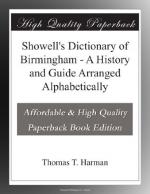Pudding Brook.—This was the sweetly pretty name given to one of the little streams that ran in connection with the moat round the old Manorhouse. Possibly it was originally Puddle Brook, but as it became little more than an open sewer or stinking mud ditch before it was ultimately done away with, the last given name may not have been inappropriate.
Quacks.—Though we cannot boast of a millionaire pill-maker like the late Professor Holloway, we have not often been without a local well-to-do “quack.” A medical man, named Richard Aston, about 1815-25, was universally called so, and if the making of money is proof of quackery, he deserved the title, as he left a fortune of L60,000. He also left an only daughter, but she and her husband were left to die in the Workhouse, as the quack did not approve of their union.
Quakers.—Peaceable and quiet as the members of the Society of Friends are known to be now, they do not appear to have always borne that character in this neighbourhood, but the punishments inflicted upon them in the time of the Commonwealth seem to have been brutish in the extreme. In a history of the diocese of Worcester it is stated that the Quakers not only refused to pay tithes or take off their hats in courts of justice, but persisted in carrying on their business on Sundays, and scarcely suffering a service to be conducted without interruption, forcing themselves into congregations and proclaiming that the clergymen were lying witnesses and false prophets, varying their proceedings by occasionally running naked through the streets of towns and villages, and otherwise misbehaving themselves, until they were regarded as public pests and treated accordingly. In the year 1661, fifty-four Quakers were in Worcester gaol, and about the same time seven or eight others were in the lockup at Evesham, where they were confined for fourteen weeks in a cell 22 ft. square and 6 ft. high, being fed on bread and water and not once let out during the whole time, so that people could not endure to past the place; female Quakers were thrust with brutal indecency into the stocks and there left in hard frost for a day and night, being afterwards driven from the town. And this went on during the whole of the time this country was blessed with Cromwell and a Republican Government.—See “Friends.”
Quaint Customs.—The practice of “heaving” or “lifting” on Easter Monday and Tuesday was still kept up in some of the back streets of the town a few years back, and though it may have died out now with us those who enjoy such amusements will find the old custom observed in villages not far away.—At Handsworth, “clipping the church” was the curious “fad” at Easter-time, the children from the National Schools, with ladies and gentlemen too, joining hands till they had surrounded the old church with a leaping, laughing, linked, living ring of humanity, great fun being caused when some of the link loosed hands and




